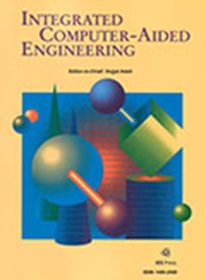An elitist seasonal artificial bee colony algorithm for the interval job shop
IF 5.8
2区 计算机科学
Q1 COMPUTER SCIENCE, ARTIFICIAL INTELLIGENCE
引用次数: 2
Abstract
In this paper, a novel Artificial Bee Colony algorithm is proposed to solve a variant of the Job Shop Scheduling Problem where only an interval of possible processing times is known for each operation. The solving method incorporates a diversification strategy based on the seasonal behaviour of bees. That is, the bees tend to explore more at the beginning of the search (spring) and be more conservative towards the end (summer to winter). This new strategy helps the algorithm avoid premature convergence, which appeared to be an issue in previous papers tackling the same problem. A thorough parametric analysis is conducted and a comparison of different seasonal models is performed on a set of benchmark instances from the literature. The results illustrate the benefit of using the new strategy, improving the performance of previous ABC-based methods for the same problem. An additional study is conducted to assess the robustness of the solutions obtained under different ranking operators, together with a sensitivity analysis to compare the effect that different levels of uncertainty have on the solutions’ robustness.区间作业车间的精英季节性人工蜂群算法
本文提出了一种新的人工蜂群算法来解决作业车间调度问题的一个变体,其中每个操作只知道一个可能的处理时间间隔。该解决方法结合了基于蜜蜂季节性行为的多样化策略。也就是说,蜜蜂在寻找之初(春天)更倾向于探索,而在接近尾声(夏至冬季)时更保守。这种新策略有助于算法避免过早收敛,这似乎是以前处理相同问题的论文中的一个问题。进行了彻底的参数分析,并对文献中的一组基准实例进行了不同季节模型的比较。结果表明,使用新策略可以提高先前基于abc的方法在相同问题上的性能。另外还进行了一项研究,以评估在不同排序算子下获得的解的鲁棒性,并进行了敏感性分析,以比较不同程度的不确定性对解的鲁棒性的影响。
本文章由计算机程序翻译,如有差异,请以英文原文为准。
求助全文
约1分钟内获得全文
求助全文
来源期刊

Integrated Computer-Aided Engineering
工程技术-工程:综合
CiteScore
9.90
自引率
21.50%
发文量
21
审稿时长
>12 weeks
期刊介绍:
Integrated Computer-Aided Engineering (ICAE) was founded in 1993. "Based on the premise that interdisciplinary thinking and synergistic collaboration of disciplines can solve complex problems, open new frontiers, and lead to true innovations and breakthroughs, the cornerstone of industrial competitiveness and advancement of the society" as noted in the inaugural issue of the journal.
The focus of ICAE is the integration of leading edge and emerging computer and information technologies for innovative solution of engineering problems. The journal fosters interdisciplinary research and presents a unique forum for innovative computer-aided engineering. It also publishes novel industrial applications of CAE, thus helping to bring new computational paradigms from research labs and classrooms to reality. Areas covered by the journal include (but are not limited to) artificial intelligence, advanced signal processing, biologically inspired computing, cognitive modeling, concurrent engineering, database management, distributed computing, evolutionary computing, fuzzy logic, genetic algorithms, geometric modeling, intelligent and adaptive systems, internet-based technologies, knowledge discovery and engineering, machine learning, mechatronics, mobile computing, multimedia technologies, networking, neural network computing, object-oriented systems, optimization and search, parallel processing, robotics virtual reality, and visualization techniques.
 求助内容:
求助内容: 应助结果提醒方式:
应助结果提醒方式:


